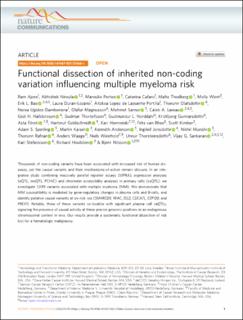Functional dissection of inherited non-coding variation influencing multiple myeloma risk
Ajore, Ram; Niroula, Abhishek; Pertesi, Maroulio; Cafaro, Caterina; Thodberg, Malte; Went, Molly; Bao, Erik L.; Duran-Lozano, Laura; Lopez de Lapuente Portilla, Aitzkoa; Olafsdottir, Thorunn; Ugidos-Damboriena, Nerea; Magnusson, Olafur; Samur, Mehmet; Lareau, Caleb A.; Halldorsson, Gisli H.; Thorleifsson, Gudmar; Norddahl, Gudmundur L.; Gunnarsdottir, Kristbjorg; Försti, Asta; Goldschmidt, Hartmut; Hemminki, Kari; van Rhee, Frits; Kimber, Scott; Sperling, Adam S.; Kaiser, Martin; Anderson, Kenneth; Jonsdottir, Ingileif; Munshi, Nikhil; Rafnar, Thorunn; Waage, Anders; Weinhold, Niels; Thorsteinsdottir, Unnur; Sankaran, Vijay G.; Stefansson, Kari; Houlston, Richard; Nilsson, Björn
Peer reviewed, Journal article
Published version

Åpne
Permanent lenke
https://hdl.handle.net/11250/3047487Utgivelsesdato
2022Metadata
Vis full innførselSamlinger
Sammendrag
Thousands of non-coding variants have been associated with increased risk of human diseases, yet the causal variants and their mechanisms-of-action remain obscure. In an integrative study combining massively parallel reporter assays (MPRA), expression analyses (eQTL, meQTL, PCHiC) and chromatin accessibility analyses in primary cells (caQTL), we investigate 1,039 variants associated with multiple myeloma (MM). We demonstrate that MM susceptibility is mediated by gene-regulatory changes in plasma cells and B-cells, and identify putative causal variants at six risk loci (SMARCD3, WAC, ELL2, CDCA7L, CEP120, and PREX1). Notably, three of these variants co-localize with significant plasma cell caQTLs, signaling the presence of causal activity at these precise genomic positions in an endogenous chromosomal context in vivo. Our results provide a systematic functional dissection of risk loci for a hematologic malignancy.
